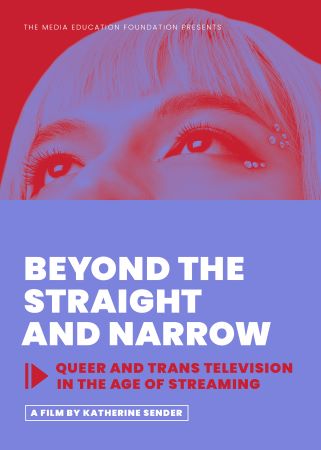
Beyond the Straight and Narrow: Queer and Trans Television in the Age of Streaming 2023
Distributed by Media Education Foundation, 60 Masonic St., Northampton, MA 01060; 800-897-0089
Produced by Sut Jhally
Directed by Katherine Sender
Streaming, 71 mins
High School - General Adult
LGBTQIA+; Mass Media
Date Entered: 01/05/2024
Reviewed by Beth Carpenter, Undergraduate Engineering & Instruction Librarian, University at BuffaloBeyond the Straight and Narrow acts as a sort of literature review for media with queer representation. Looking at the history of queer characters and storylines in television, this film gives experts weighing in on this evolution through media. There are moments of depth and insight, but far more time is given to an overview of programs that feature LGBTQ+ characters.
For people familiar with queer television, there will be nothing new in this documentary. For those coming to this topic for the first time, it will no doubt be useful as a resource to learn about queer-baiting, stereotyping queer relationships, the “Bury your gays” trope, and the importance of queer representation on screen and behind the cameras, and in the writers rooms. There are occasional insights into the fan culture that surrounds queer media that may be new to audiences as well. While the focus of the documentary is on queer representation in media, there is no real discussion of intersectional identities and representation, which would be a valuable addition to this discussion.
Strangely, it feels as if an AI voice is offering the voiceover narration to this documentary, which does break the illusion of a film focused about representation and storytelling. In addition to this narration choice, there is more of a focus on discussing representation rather than critiquing it. Supporting queer storylines does not mean holding them above critique, so when the narration and the interviewers offer blanket statements of what various showrunners or actors have done to push forward representation, without offering any counterpoint or information to counteract those statements.
Near the end of the documentary, there is discussion of how there is more of an idyllic view of queer relationships and representation on television than there is in the real world (or at least in the United States). This feels like a far more interesting point that could have used more time, rather than just the last ten minutes.
Published and licensed under the Creative Commons Attribution 4.0 license. Anyone can use these reviews, so long as they comply with the terms of the license.